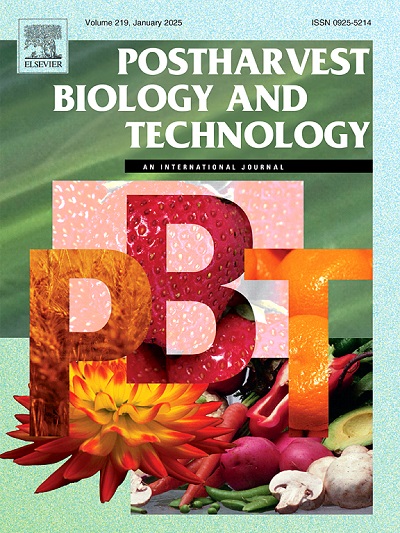Histone deacetylase MdHDT3 suppresses ethylene biosynthesis by deacetylating MdACS1 and MdACO1 during apple fruit ripening
IF 6.4
1区 农林科学
Q1 AGRONOMY
引用次数: 0
Abstract
Apple (Malus domestica) is a climacteric fruit whose ripening is primarily controlled by ethylene. Histone acetylation functions in ethylene biosynthesis during apple ripening, but its underlying molecular mechanisms in ethylene biosynthesis are unclear. Therefore, this study aims to investigate the effects and potential molecular mechanisms of histone modifications in ethylene synthesis during apple fruit ripening. RNA sequencing was performed on apple fruit treated with histone deacetylase inhibitor sodium butyrate to identify histone deacetylases. Additionally, we examined the effects of a specific histone deacetylase on ethylene production and ethylene-related genes. Among the six histone deacetylases identified in the apple fruit, MdHDT3 had the highest expression level during ripening. Treatment with sodium butyrate significantly inhibited MdHDT3 expression and promoted ethylene biosynthesis in apple fruit. Additionally, MdHDT3 suppressed the expression of key genes involved in ethylene biosynthesis (MdACS1 and MdACO1) via deacetylation, thereby negatively regulating ethylene biosynthesis. Conclusively, this study provides insight into the molecular mechanism by which the histone deacetylase MdHDT3 inhibits ethylene synthesis in apple fruit from an epigenetic perspective.
组蛋白去乙酰化酶 MdHDT3 在苹果果实成熟过程中通过去乙酰化 MdACS1 和 MdACO1 来抑制乙烯的生物合成
苹果(Malus domestica)是一种气候性水果,其成熟主要受乙烯控制。组蛋白乙酰化在苹果成熟过程中的乙烯生物合成中发挥作用,但其在乙烯生物合成中的潜在分子机制尚不清楚。因此,本研究旨在探讨苹果果实成熟过程中组蛋白修饰对乙烯合成的影响及其潜在的分子机制。用组蛋白去乙酰化酶抑制剂丁酸钠处理苹果果实,对其进行 RNA 测序,以确定组蛋白去乙酰化酶。此外,我们还研究了特定组蛋白去乙酰化酶对乙烯产量和乙烯相关基因的影响。在苹果果实中发现的六种组蛋白脱乙酰酶中,MdHDT3在成熟期的表达水平最高。用丁酸钠处理可明显抑制 MdHDT3 的表达,促进苹果果实中乙烯的生物合成。此外,MdHDT3 通过去乙酰化作用抑制了参与乙烯生物合成的关键基因(MdACS1 和 MdACO1)的表达,从而对乙烯生物合成产生负调控作用。总之,本研究从表观遗传学的角度揭示了组蛋白去乙酰化酶 MdHDT3 抑制苹果果实乙烯合成的分子机制。
本文章由计算机程序翻译,如有差异,请以英文原文为准。
求助全文
约1分钟内获得全文
求助全文
来源期刊

Postharvest Biology and Technology
农林科学-农艺学
CiteScore
12.00
自引率
11.40%
发文量
309
审稿时长
38 days
期刊介绍:
The journal is devoted exclusively to the publication of original papers, review articles and frontiers articles on biological and technological postharvest research. This includes the areas of postharvest storage, treatments and underpinning mechanisms, quality evaluation, packaging, handling and distribution of fresh horticultural crops including fruit, vegetables, flowers and nuts, but excluding grains, seeds and forages.
Papers reporting novel insights from fundamental and interdisciplinary research will be particularly encouraged. These disciplines include systems biology, bioinformatics, entomology, plant physiology, plant pathology, (bio)chemistry, engineering, modelling, and technologies for nondestructive testing.
Manuscripts on fresh food crops that will be further processed after postharvest storage, or on food processes beyond refrigeration, packaging and minimal processing will not be considered.
 求助内容:
求助内容: 应助结果提醒方式:
应助结果提醒方式:


